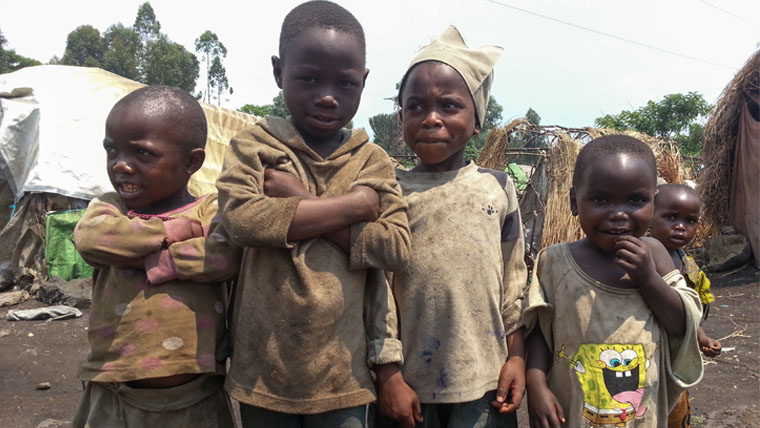Eastern DRC: Inside a makeshift camp with children
World Vision responds to child protection concerns in Eastern DRC – ensuring Child Friendly Spaces for displaced children.

By Aimee Manimani, World Vision DRC Senior Communications Officer
Amani wakes up and gets ready to leave. She hurries to leave her house made of sticks and banana leaves. “Get to the farm, get to the farm” she tells herself. Within a few minutes, she’s out the door, running past the hundreds of other banana leaf shelters that have been quickly constructed by other displaced families.
“Sometimes we don’t find something to eat, then as now, we remain hungry all day or even two days” Amani explains.
Amani lives with aging grandmother, who doesn’t have the strength to do physical work anymore. Her parents died and so has her older brother. At seven years old, Amani is the family’s breadwinner.
She must work every day to eat. She cannot afford to dream of going to school, or having nice, clean clothes. She must only think about working in the fields if she is to survive.
This community is not Amani’s home either. It’s the place she took refuge after armed violence broke out in her home in Kalehe. She and her grandmother fled with just the clothes on their backs, along with thousands of other children and their families. Now she is based in an Internally Displaced Persons (IDP) camp, 50km south of Goma in Eastern DRC.
Hundreds of children in these camps are accompanied by their parents, but many unfortunately don’t have enough resources to meet the basic needs of their families. Some children are alone, orphaned after their parents have been killed in their homes or on the road, or have been lost in the rush of their sudden departure. Other children have fled armed groups looking to recruit children by force. This means there are many child-headed households in the camps.
Many, like Amani, are forced to work in the fields, or those considered “lucky” get to do domestic labour in local homes, where they take care of other children, do housework and carry supplies.
“I wake up at five o’clock and I go to fetch water. I then wash the dishes, I have to go to the market, help in the kitchen, and prepare their children returned from school” says another one of the camp’s children, a 12-year-old girl from Bishangie.
These children are often cheated, some people refuse to pay them after their work, they are attacked and sometimes run the risk of rape and other violence from their employers.
“Sometimes people do not pay us after work, they chase us, this girl there who carries a cane was bitten by a dog belonging to her employer when she claimed her pay” says 11-year-old Moses, another camp dweller.
Most displaced children cannot also access any form of education in these settings. They are separated from their schools, and cannot afford to pay school fees.
“I was in fourth year of primary school when we were still living (in her village), it was very nice … I know why my parents cannot send me to school, because they have no means. They are sick since we got here, I have to go with other children cultivate the fields to be able to eat” says Beatrice, 13 years old.
Despite the hardships she is facing, Amani and some of the other camp children finds some joy in a World Vision established Child Friendly Space. The Child Friendly Space identifies and manages the needs of orphans and vulnerable children in these camps – attempting to limit their exposure to further risks they may face.
“When we approach these children for the first time, they are fearful and do not want to talk to neither us nor to other children, they sit alone in a corner. They reject all foreign persons, they are suspicious and violent. We then multiply efforts to engage with them a sort of conversation” explains Balolebwami Senghor, a worker at a World Vision Child Friendly Space.
“Our activities are mainly recreational and creative, young children play games, read, and dance traditional dances. Older children learn life skills, like how to repair their clothes and grow vegetables to feed themselves.” Balolebwami explains.
The reaction from children involved in the program has been overwhelmingly positive.
“I like the games here, especially the jump rope. I dream of going to school one day of having notebooks, new clothes, schoolbags, etc. At home, I did not study, I helped my mother to keep my little brother while she was working on the farm.” Amani says.
Through the Child Friendly Spaces, many affected children can regain their smiles, find support and welcoming voices willing to listen, play games and other recreational activities, and spend positive time in the care of adults and other children. This is an invaluable step in their process of healing, helping them come to terms with and understand how to protect themselves in the living conditions in which they now find themselves.
*Names changed for the children’s security.
While the situation in and around Eastern DRC remains volatile, World Vision is distributing food, and preparing to resume work providing safe spaces for children, clean water and sanitation facilities, as soon as it’s safe to continue this work.
If you’d like to help children affected by the DR Congo Crisis, you can donate here.